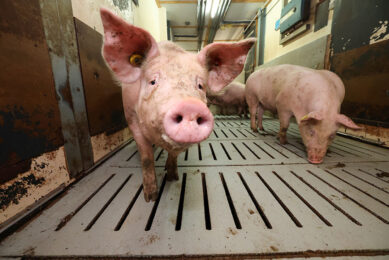USDA: Swine genome project completes 1st draft
An international team of scientists, funded with a $10 million grant from the National Institute of Food and Agriculture (NIFA), has completed the first draft of the genome of a domesticated pig. This first draft sequence will spur advancements in swine production and human medicine.
“Understanding the swine genome will lead to health advancements in the swine population and accelerate the development of vaccinations for pigs,” said Roger Beachy, NIFA director. “This new insight into the genetic makeup of the swine population can help reduce disease and enable medical advancements in both pigs and humans.”
At 98% complete, the draft sequence will allow researchers to pinpoint genes that are useful to pork production or are involved in immunity or other important physiological processes in the pig. It will enhance breeding practices, offer insight into diseases that afflict pigs — and, sometimes, also humans — and will help in efforts to preserve the global heritage of rare, endangered and wild pigs.
NIFA, previously the Cooperative State Research, Education, and Extension Service, provided the $10 million in funding in 2006 to the University of Illinois at Urbana-Champaign (UIUC). The total cost was about $24.3 million, with additional support from USDA’s Agricultural Research Service and various American, Asian and European funders.
UIUC selected a red-haired Duroc pig from a farm at the university to use for the sequencing project. The Duroc now will be among the growing list of domesticated animals that have had their genomes sequenced.
Related website
• NIFA USDA











